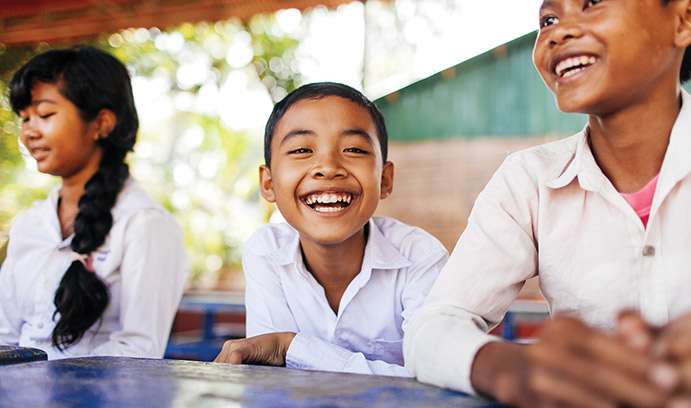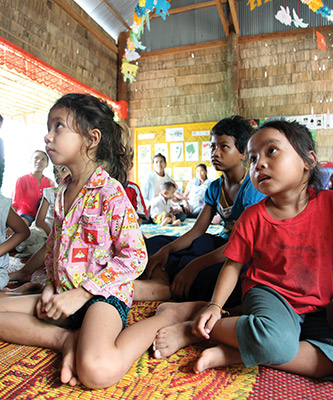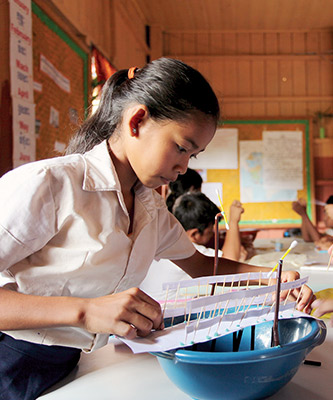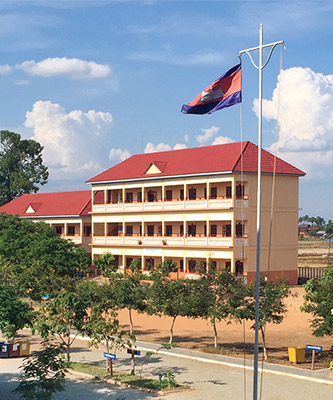A Labor of the Heart

The Lehigh University-Caring for Cambodia partnership takes an innovative approach to sustainable education.
The Lehigh University-Caring for Cambodia partnership is an intellectual and innovative endeavor that epitomizes the core of the College of Education's mission: to develop reflective professionals and scholars who are informed by theory, research and evidence-based practice.
Now entering its sixth academic year, the unique partnership aims to give Lehigh students practical learning experiences grounded in exemplary instruction and training and cutting-edge research. At the same time, it aims to provide Caring for Cambodia with much needed documentation, analysis and research to support the non-profit organization's schools and programs in Siem Reap.
"Traditionally [college] students take up to one year after graduation to gain practical experience," said Sothy Eng, professor of practice in Comparative and International Education and director of the LU-CFC partnership. "Now, with this partnership, students can use what they learn in class here on campus and have the advantage of taking that knowledge and applying it to real-world experiences in Cambodia. They learn how to come up with research ideas and research questions. They learn the whole process of doing research. These theory-to-practice opportunities allow students to enter the work force with a competitive curriculum vitae."
Caring for Cambodia was created in 2003 by Jamie Amelio and her husband Bill '79,'08H. While touring the famous temples of Angkor Wat during a visit to Cambodia, Jamie was approached by a 9-year-old girl who asked for a dollar to go to school. After seeing first-hand the deplorable conditions in the schools and learning about the genocide in the late 1970s that had targeted the educated, Jamie vowed to help Cambodia's children.
The Amelios first raised money to buy uniforms and backpacks for a school in Siem Reap, then opened CFC's first school, the Spean Chreav Amelio Primary School. Over the next 13 years, CFC grew and now operates 21 schools, all in Siem Reap, that support more than 6,600 Cambodian children and provide health and dental screenings, early education and other programs.
"It's a labor of the heart," said Bill Amelio, who speaks passionately about the schools, students and teachers. "We've nailed the program down as far as what works, what doesn't." Now the question is, "how do we make it sustainable?"
Amelio isn't alone in seeing the potential for the CFC model to make a tremendous impact on Cambodian education.
A declaration in 2014 by Cambodia's Minister of Education, Youth and Sport, Hang Chuon Naron, states that Caring for Cambodia is "the standard of education" for the Southeast Asian country. "We are designating CFC schools as the model schools for all of Cambodia," Naron said. "We need to learn from what has been done here and spread the best practices across the country." In 2016, the Ministry's Education Congress report mentioned CFC's exemplary library and career preparation programs.
From the start, Bill Amelio said, they sought to make the CFC model sustainable and scalable as well as the de facto standard of education for pre-K through 12th grade.They wanted CFC students to acquire the skills they'd need to get a job or pursue higher education.
"We also wanted to stay true to what we do and focus on the critical few [goals] and not the trivial many," said Amelio, who has held top positions in companies that include IBM, Dell computers and Lenovo. "That served me well in business, and it serves well in charities. One of the reasons most charities fail is that they want to do too many things, and they have trouble getting things done."
As part of the approach to careful management of the CFC model, Lehigh faculty and students have utilized sound educational research to help CFC to better understand its current programs. Through the partnership, more than 150 Lehigh students have travelled to Cambodia to collect data and implement programs related to their coursework.
Lehigh students and faculty have produced some 30 reports and grant proposals, allowing CFC to better assess what works. Among the findings:
- Students in CFC schools are significantly less likely to drop out of school than those in other government schools.
- Parents who participate in CFC's village-based preschool program enroll their children in primary schools 1.5 years sooner than parents who do not participate in the program. That's significant, Eng says, given that late enrollment has been a concern throughout Cambodia, as parents often don't understand the importance of enrolling their children in first grade at the appropriate age, which is 6.
- CFC graduates are more likely to go to college. A 2016 study showed that 34 percent of CFC graduates have gone on to college, compared with the national average of less than 15 percent.
- Among teachers, 86 percent saw remarkable improvements in student attendance and achievement as a result of CFC's Food for Thought program, which provides students and families who bring them to school with the opportunity to eat two meals per day. It now provides 240,000 meals each month to students and their families.
"If you can't think when you are at school because you're hungry, you're not going to learn," said Bill Amelio, who, though initially reluctant to launch the food program because he feared CFC was trying to do too much, became convinced it was the right thing to do.
In other CFC programs, hands-on teacher training has resulted in more interaction between teachers and students, brighter classrooms and more effective teaching, Bill Amelio said. CFC provides stipends and bonuses to teachers so they refrain from the pervasive and problematic practices associated with private tutoring. A Lehigh evaluation conducted in 2015 indicates that the training and workshops have led to more student-centered learning in their classrooms.
Although housed in the College of Education, the partnership draws students from across Lehigh's other three colleges (Engineering, Arts and Sciences, Business) and disciplines. Undergraduates in the Computer Science and Business Program have been working for three years to develop a new database system for CFC schools that will allow for better tracking of data, such as grades, absences and health information. Led by professor Ronald W. Crane, the students also have created a mobile application to collect attendance data for Food for Thought and are working on enhancements to the Health Information module.
It is from this cultivated interdisciplinary and collaborative effort that a Mountaintop Initiative project began to take shape.
"The partnership is growing, and we needed to ask some big questions related to sustainability and education," said Whitney Szmodis, a Lehigh research scientist for the partnership. "Mountaintop is the perfect setting to bring students and faculty together to pursue meaningful and innovative answers to those questions."
The Mountaintop Initiative allows faculty and students to escape a classroom's confines and design projects that emerge from what a team wants to know, not what it needs to know to pass a course or learn a skill. The experience fosters exploration of open-ended questions with no right or wrong answer.
Over 10 weeks in summer, a team of six graduate and undergraduate students from diverse backgrounds explored whether the CFC model can be realized, implemented and sustained sans the benefit of an NGO-managing entity at the national level, and if not, what are the ramifications of reliance on external entities for a national education system? The team was led by Eng, Szmodis and Mark Orrs, professor of practice and director of Lehigh's Sustainable Development Program.
"We wanted a team that could explore all angles of sustainability, including the relationship between schools and the social, economic and environmental influences they face," said Szmodis. "The best way to wrap our heads around these big questions is to bring together a diverse group of students to try and better understand the dynamic relationships between schools, systems and their ability to evolve in sustainable ways."
The team—Fulbright scholar Fayaz Amiri '16, Harneel Riar '18, Mikayla Cleary-Hammarstedt '18, Nicole McCallum '18 and doctoral candidates Anuradha Sachdev and Fatih Aktas '13G—explored how the relationship between Cambodia's socio-political and economic climate drives discourse around sustainability.
"Working with the Mountaintop team provided a great opportunity to look at my research with a new perspective in the context of current geopolitical discourses and socio-cultural needs of Cambodian students and their families," Sachdev said. "As a doctoral student, I have worked with the LU-CFC partnership for many years. Mountaintop is unique in that our team's cross-disciplinary perspectives provided us with rich discussions that deepen our understanding and gave us new lenses to examine the multiple dimensions of the issues surrounding educational change in Cambodia. The energy from our team was infectious. We had fun!"
The team looked at where CFC and ministry programs were already in alignment and where there were gaps. It built a 3-D model of a CFC school, using 3-D resources available to all Mountaintop teams, as well as an online virtual site to better disseminate information and spur discussion. Ultimately, team members said, they hoped to create a framework for programming that will lead to policy recommendations for the Cambodian Ministry.
""I have been working with the LU-CFC partnership for four years, looking at various projects and finding ways for sustainable development and educational change to critically examine international development," said Orrs. "Our Mountaintop project has brought all of this hard work together to create a new and creative way to collaborate for years to come."
As the Mountaintop team addressed how to create and maintain a sustainable school model within Cambodia's existing educational system, it also began to examine how CFC programs could be streamlined or modified. "We don't know," Szmodis said. "We're asking those very big questions."
As for the future of the LU-CFC partnership, this is "the first big step toward understanding how we can provide Lehigh students with an enhanced experience that includes opportunities to think outside the box, while at the same time recognizing the importance of aligning those ideas with rigorous theoretical analysis," said Eng.
The outcomes from the Mountaintop project will provide faculty and students with a clear vision of how to incorporate many of the identified areas of interest into their classrooms and research in the upcoming year. The research will be ongoing.
Photography by Milo Zanecchia
Posted on:




